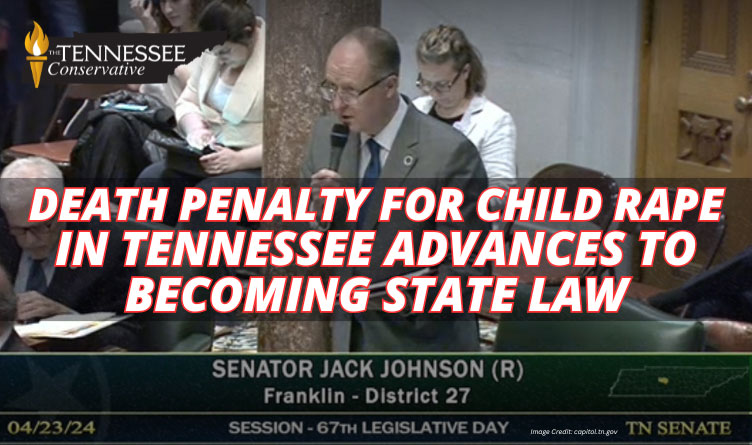Image Credit: capitol.tn.gov
The Tennessee Conservative [By Kelly M. Jackson] –
This week, a bill that would allow the application of the death penalty for the crime of rape of a child in the state of Tennessee has moved closer to becoming law.
Last week, the House version of the bill was pulled out from behind the governor’s budget and passed through all applicable committees and on the house floor, before being sent to the senate to wait for their concurrence.
HB1663/SB1834 sponsored by Rep. William Lamberth (R-Portland-District 44) and Senator Jack Johnson (R-D27-Franklin) would allow a jury to apply the death penalty as punishment for adults who commit rape of a child, aggravated rape of a child, and especially aggravated rape of a child.
These charges are all Class A felonies in Tennessee and current state law outlines that a person convicted of rape of a child must receive a minimum sentence of 35-40 years and if appropriate a 40–60-year sentence.
Also under current state law, a person convicted of aggravated rape of a child must be sentenced to imprisonment for life without the possibility of parole.
The bill gives the death penalty as “another option” as punishment for “rape of a child, aggravated rape of a child, or especially aggravated rape of child.” Despite discussion regarding the constitutionality of the legislation, Senator Ken Yager (R-Kingston-District 12), assured the Senate body as discussion of the proposed amendments commenced, that the bill would in fact pass “constitutional muster”.

There was an animated debate and questions regarding the constitutionality of the bill, which was led by Senator Kerry Roberts (R-Springfield-District 23) who reintroduced an amendment that was previously voted down in the Senate Judiciary Committee.
Robert’s amendment would allow the death penalty only in those cases where serious bodily injury took place and biological evidence of the crime had been collected. He said that because most cases of this type were decided on circumstantial evidence, and that rape was defined very broadly in the state, that he believed SB1834 would inadvertently reaffirm Kennedy V Louisana.
In that precedent setting case, a Louisiana man who had raped his 8-year-old stepdaughter, was tried and convicted of rape of a child, and sentenced to death, as was the option under the law in Louisiana.
However, the appeals process landed the case in 2008 before the Supreme Court, that held the death penalty to be “cruel and unusual punishment” for a crime that although heinous, did not result in a death, under the 8th amendment of the Constitution.
This new bill here in Tennessee, could potentially present opportunities to overturn the Kennedy v. Louisiana ruling, because the majority rationale of the Supreme Court, was based on a case, Coker V Georgia, which held that death is an inappropriate penalty for the rape of an adult.
In Kennedy, the minority dissent written by Justice Alito, conveys that the Coker decision “has stunted legislative consideration of the question whether the death penalty for the targeted offense of raping a young child is consistent with prevailing standards of decency.”
Justice Alito continued in his dissent “The Coker dicta gave state legislators and others good reason to fear that any law permitting the imposition of the death penalty for this crime would meet precisely the fate that has now befallen the Louisiana statute that is currently before us, and this threat strongly discouraged state legislators—regardless of their own values and those of their constituents—from supporting the enactment of such legislation.”
Finally, Alito stated that because there is a difference between the rape of an adult woman and the targeted rape of a child, Coker should therefore not control the decision of the court to determine that death would be too severe a penalty.

Based on those statements, it leaves room for a future case to make its way once again to The Supreme Court, where facing a court whose constitution is markedly more conservative than the court under both previous decisions, may overturn Kennedy signaling to state legislatures that are inclined to enact similar legislation.
After much discussion, the Senate concurred with the House with 23 Ayes, and 5 Nays, with the amendment attached, which can be reviewed here.
Some of the more notable contents of the amendment mention exceptions for the death penalty for those who are determined to be intellectually or mentally disabled, as well as for those perpetrators who are juveniles when they commit the crime.
We will continue to report on this legislation as more details are made available.


About the Author: Kelly Jackson is an escapee from corporate America, and a California refugee to Tennessee. Christ follower, Wife and Mom of three amazing teenagers, she has a BA in Comm from Point Loma Nazarene University, and has a background in law enforcement and human resources. Since the summer of 2020, she has spent any and all free time in the trenches with local grassroots orgs, including Mom’s for Liberty Williamson County and Tennessee Stands as a core member. An outspoken advocate for parents rights, medical freedom, and individual liberty, Kelly also has a YouTube channel @Tennessee_Truth_Teller and is planning on expanding out to other channels soon. Kelly can be reached at kelly@tennesseeconservativenews.com.



2 Responses
Another waste of taxpayer money. We all know that if sentenced to death, most will die a natural death while the bleeding hearts spend more money to keep them alive. Of course, sane taxpayers will be footing the bill.
Who are they defining as a “child”? I hope all who are under age 18. Period.